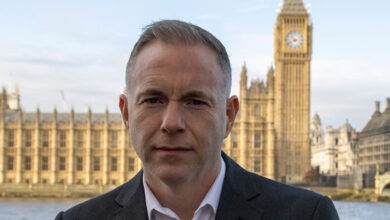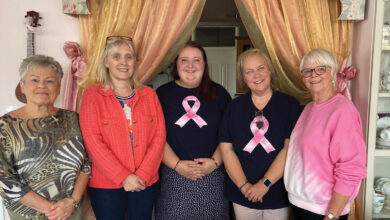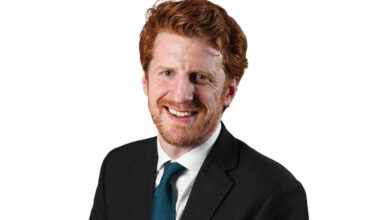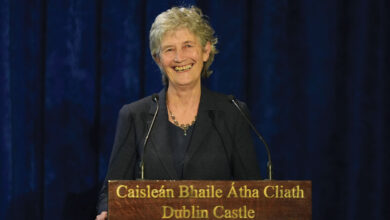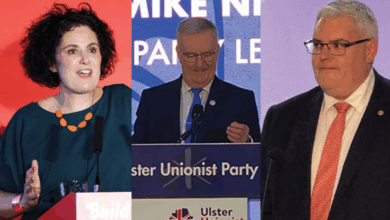DUP: Standing strong for Northern Ireland
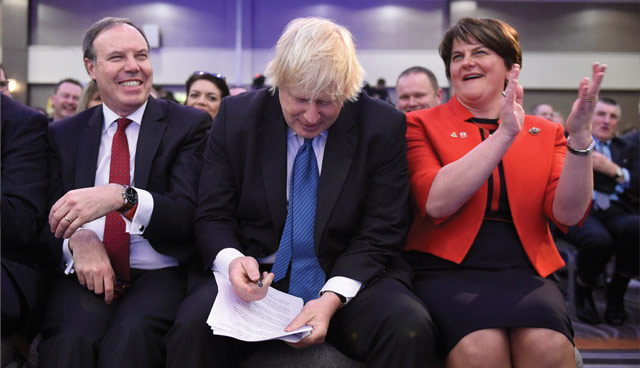
Talk of Stormont’s restoration was notably light at the DUP’s 2018 annual conference, an event dominated by Brexit and the appearance of Conservative MP Boris Johnson, writes David Whelan from the conference.
If the DUP hadn’t up until this point made clear their rigid rejection of the withdrawal agreement hammered out by Theresa May and the EU, then the speaking slots of their Conservative Party guests at this year’s conference would certainly have done the trick.
While conference is a gathering of party members, it’s also recognised as a platform from which the party’s message can reach the wider public through an assembly of local and national media.
The appearance of the Government’s Chancellor of the Exchequer would in previous years have been the major crowd draw and headline act of conference, instead that title was bestowed upon resigned former Foreign Secretary, Boris Johnson. Philip Hammond, a supporter of the agreement, instead spoke at the private members’ dinner on the eve of conference, undoubtedly telling party members what they didn’t want to hear, that the deal was the best economic hope in the current context.
It’s reported that Hammond, even in advocating the deal, stated that it would not be good for the economy and this was used by DUP deputy leader Nigel Dodds in his outline of the party’s objection to the deal.
“Those who say this backstop is good for our economy or business need to consider the effect of the trade barriers and growing divergence that would inevitably emerge, some immediately, most in future years, between Northern Ireland and the rest of the UK…our main market and from where most of our inward trade comes from,” he said.
Adding: “No wonder the Chancellor of the Exchequer said it’s not good for our economy, it’s not good for our union.”
Dodds’ speech mimicked a lot of what had been said previously by his wife, MEP Diane Dodds who urged for “proactive solutions” to an “evocative subject”. Adding: “We are not advocates for a no‑deal outcome. We are not advocates of a bad deal. We are advocates for the right deal.”
However, the deputy leader chose a more targeted approach. In a warning to Theresa May he highlighted the role the DUP has played, including on Brexit, in securing a government majority in most issues. “The confidence and supply deal is a two-way street. The Government’s commitments under it are clear, including on Brexit. Commitments freely entered into must be delivered and if they are not, then clearly, as we have shown, there are consequences,” he declared.
Dodds also opted to criticise the Irish Government’s role in Brexit: “There will be those who will continue to exploit Brexit, to try and weaken the union and to further their own political agendas, but in doing so, they do irreparable damage to the public’s faith in politics and to relationships on these islands.
“Be it those using the hard won peace in Northern Ireland as a political football to thwart or delay Brexit. Or those in other jurisdictions, trying to play up their Republican credentials in advance of a forthcoming general election. By their actions they do more to advance the possibility of a so called no deal Brexit than anyone.”
Boris Johnson
While the appearance of the Uxbridge and South Ruislip MP Boris Johnson may have heightened media interest in the event, it was difficult to tell whether it had the same impact on party members. A switch of venue from the traditional La Mon Hotel to Crowne Plaza, Belfast made for a difficult comparison in attendance, however, it was noted that seats were not as hard-fought as previously predicted.
Johnson’s opening address to “my fellow unionists” was warmly received but there was a general consensus that the room’s energy dwindled as he loosely threaded references to the Titanic, Bangor-based bus builder Wrightbus and even light sabres into his Northern Ireland-themed critique of the withdrawal agreement. His nod and seeming approval of the idea of the DUP-proposed bridge to Scotland was another cause for applause.
“Junk the backstop” was Johnson’s main message, in a speech that lacked the vigour some expected from a potential future Conservative Party leader and prime minister. However, amid the bravado, the former Foreign Secretary outlined his six priorities for changing the current context around Brexit. In summary, these were: bank what is sensible in the withdrawal agreement, junk the backstop, agree in the text of the withdrawal agreement an FTA on super-Canada lines, dedicating the implementation period to the negotiations, withhold at least half the divorce bill money until the FTA is agreed at the end of 2020, create a Secretary of State for no deal or WTO terms and urgently recover confidence and self-belief around Brexit.
RHI apology
Johnson’s somewhat sarcastic tone was in contrast to that of Arlene Foster, who spoke with a well-versed assertiveness. Her tone was echoed in her comments when, while referencing a greater global interest in the party, she stated: “We must say what we mean and mean what we say.”
In the context of local elections in 2019, increasing rumours around her future as leader and the imminent publication of a review by Sir Patrick Coghlin into the handling of the Renewable Heat Incentive in Northern Ireland, Foster took the surprising approach to meet the issue head on.
“My motivation in government was always to do the right thing at the right time and for the right reasons,” she said. “But the best intentions doesn’t make you immune from mistakes or misjudgements. Some of our past decisions and actions have left a lot to be desired, and I know that they have personally hurt and offended many of our members, voters and the public.”
She went on to say: “Today as leader of the party I apologise. As a party we are deeply, deeply sorry for the mistakes we made, and for the things we got wrong during that period.”
Critics will point to the use of ‘we’ throughout the lengthy apology, which included a pledge to continue a process of “renewal and self-examination” for the party, and the lack of any individual accountability by the former DETI Minister.
Aside from the topic of Brexit, where Foster echoed the sentiments of her party colleagues, she did touch briefly on the situation at Stormont and perhaps reopened the potential for renewed talks.
“I am as committed to devolution today, as I was the day the institutions stopped functioning,” she said, before outlining her belief that not enough progress was made during the last decade of an Executive. The case for change is not limited to our politics and institutions but change is required in how we work together with other parties in coalition and how that coalition works with the Civil Service.”
In what could be viewed as a softening on the legislative changes being asked by Sinn Féin, she said: “In any new Northern Ireland administration, and during talks that might bring one about, I want all parties to have their mandates respected.” This shift is further evidenced in Foster’s reference to a “new cultural deal” for everyone, a potential compromise on Irish Language Act demands.
Foster’s olive branch didn’t just extend to Sinn Féin, in what appeared to be an invite to the smaller parties back into a future Executive, she says: “I will encourage the full involvement of all parties capable of holding Ministerial Office, and want their contribution considered and acted upon, on its merits.”
Foster concluded by saying: “Now is the time to learn lessons from the past, look forward to the future and shape it with confidence.”
Her decision not to name-check Sinn Féin or the UUP goes someway to show the differing context of the 2018 conference and those that have went before it. Following a common thread that was evident throughout the day, Foster inadvertently confirmed what many already knew: that, for now, Brexit is the only show in town.

